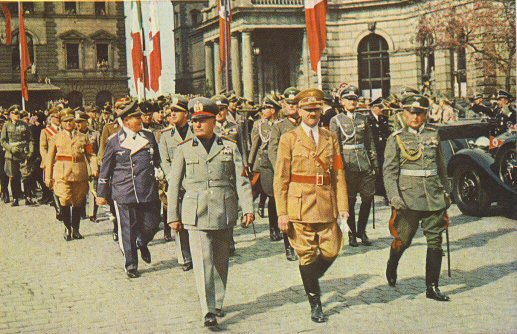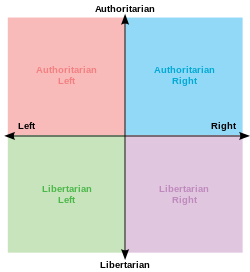- This topic has 95 replies, 34 voices, and was last updated 12 years ago by cheekyboy.
-
What's the difference between socialism and fascism?
-
SurroundedByZulusFree MemberPosted 12 years ago
They would when taken at face value appear to be the polar opposite of each other, but when you think about it a bit more are they not just the same thing?
ernie_lynchFree MemberPosted 12 years agobut when you think about it a bit more are they not just the same thing?
Try not to think about it then.
neilthewheelFull MemberPosted 12 years agoThink of politics as a circle, not a spectrum.
But I disagree with your comparison – communism maybe, socialism nahSurroundedByZulusFree MemberPosted 12 years agoI spend a lot of time on the bus. I was reading something about the Nazi party and something about Communist Russia and that’s the question that came out of it.
Of particular interest was the expanded name of the Nazi Party – National Socialist German Workers’ Party.
TheBrickFree MemberPosted 12 years agoThere strongest similarity is the authoritarian forms which they are most popularly known for, ideologically they are far apart.
molgripsFree MemberPosted 12 years agoYou are wasted
as a physio really,aren’t you?They are not mutually exclusive. Fascism is about ruling by force, and socialism is about public ownership. Quite possible to be both I reckon.
loumFree MemberPosted 12 years agoFascism has traditionally been supported by the middle classes, socialism by the working classes.
Perhaps the most obvious example:
An opportunist to his bones, Mussolini early mastered the direction of the winds and learned quickly to turn full sail into them.
From Socialist to Fascist
This much-envied talent led Mussolini to desert the Socialist party in 1914 and to cross over to the enemy camp, the Italian bourgeoisie. He rightly understood that World War I would bury the old Europe. Upheaval would follow its wake. He determined to prepare for “the unknown.” In late 1914 he founded an independent newspaper, Popolo d’Italia, and backed it up with his own independent movement (Autonomous Fascists). He drew close to the new forces in Italian politics, the radicalized middle-class youth, and made himself their national spokesman.Mussolini developed a new program, substituting nationalism for internationalism, militarism for antimilitarism, and the aggressive restoration of the bourgeois state instead of its revolutionary destruction. He had thus completely reversed himself. The Italian working classes called him “Judas” and “traitor.” Drafted into the trenches in 1915, Mussolini was wounded during training exercises in 1917, but he managed to return to active politics that same year. His newspaper, which he now reinforced with a second political movement (Revolutionary Fascists), was his main card; his talents and his reputation guaranteed him a hand in the game.
Besides totalitarianism, a key distinguishing feature of fascism is that it uses a rightist mass movement to attack the organizations of the working class: parties of the left and trade unions. This strategy is variously called Corporatism, Corporativism, or the Corporative State [2], all terms that refer to state action to partner with key business leaders, often in ways chosen to minimize the power of labor unions. Mussolini, for example, capitalized on fear of an imminent Socialist revolution [3], finding ways to unite Labor and Capital, to Labor’s ultimate detriment. In 1926 he created the National Council of Corporations, divided into guilds of employers and employees, tasked with managing 22 sectors of the economy. The guilds subsumed both labor unions and management, but were heavily weighted in favor of the corporations and their owners. The moneyed classes in return helped him change the country’s laws to raise his stature from a coalition leader to a supreme commander. The movement was supported by small capitalists, low-level bureaucrats, and the middle classes, who had all felt threatened by the rise in power of the Socialists.
nick1962Free MemberPosted 12 years agoSBZ
Stick to the Metro next time and send in some texts about hot bus drivers and passengers like everyone else seems to do
JunkyardFree MemberPosted 12 years agoThey would when taken at face value appear to be the polar opposite of each other
yes they would
, but when you think about it a bit more are they not just the same thing?
no they are not
scaredypantsFull MemberPosted 12 years agois that the one where they kill piggy and feed him to the jesus lion ?
RustySpannerFull MemberPosted 12 years agoSurrounded By Zulus – Member
What’s the difference between socialism and fascism?Fascists tend to have by far the campest uniforms:
I spend a lot of time on the bus. I was reading something about the Nazi party and something about Communist Russia and that’s the question that came out of it.
Of particular interest was the expanded name of the Nazi Party – National Socialist German Workers’ Party.
Well, Communist Russia wasn’t really communist and the Nazi party wasn’t in any way socialist.
kimbersFull MemberPosted 12 years agoits all about the moustache
stalin vs hitlers
the implications for tom selek are obvious
scaredypantsFull MemberPosted 12 years agoFascists tend to have by far the campest uniforms
Also, I’ve always thought the extent of totalitarianism in a state can be gauged by the silly march/salute coefficient of their army
the implications for tom selek are obvious
OMG! Magnum was bumming the posh fella with the dobermans all along ??!!
Was the Ferrari a nod to Mussolini ?B.A.NanaFree MemberPosted 12 years agoAlso, don’t confuse Nazism and Fascism, different as well. Nazism focused on race as the base point, fascism focused on the state/country. Fundamentally different and yet very similar/identical in so many other respects.
yunkiFree MemberPosted 12 years agoI’ve always thought the extent of totalitarianism in a state can be gauged by the silly march/salute coefficient of their army
how do you account for the Greeks..?
IanWFree MemberPosted 12 years agoThe answers are easy once you forget your dogma, always have been.
ernie_lynchFree MemberPosted 12 years agoKind of
Most “definitely” for the Greeks which lived through the period when the army overthrew the elected government and installed themselves as a despised fascist dictatorship which was fully supported by the United States, and which the US insisted remained a NATO member.
GlitterGaryFree MemberPosted 12 years agoWe’ve never had true socialism in a country before, so the answer is: NO.
mcbooFree MemberPosted 12 years agoFascism stems from fear and hatred of the other, is nationalist, often traditionalist and religious in character.
With Socialism everyone exists in a state of cuddly warm ethical nirvana. That sounds nice. I’m going to be a socialist.
buzz-lightyearFree MemberPosted 12 years ago
“Rokeach”
Socialists (socialism) – Freedom ranked 1st, Equality ranked 2nd
Hitler (nazism) – Freedom ranked 16th, Equality ranked 17th
Goldwater (capitalism) – Freedom ranked 1st, Equality ranked 16th
Lenin (communism) – Freedom ranked 17th, Equality ranked 1stmogrimFull MemberPosted 12 years agoWe’ve never had true socialism in a country before, so the answer is: NO
You could change “socialism” in that phrase for pretty much any political ideology, though.
From what I’ve read a lot of what we consider fascist states (the Nazis, Mussolini, Franco etc.) had a lot in common with what is considered a socialist economy: large capital and labour intensive projects, state control or interference of strategic industries, etc. At the same time, however, they allow private industry (often in close cooperation with the government) to own and run these projects. Basically the worst of all worlds: no freedom, inefficient state run industries, and state-sponsored inequality.
mogrimFull MemberPosted 12 years ago“Rokeach”
Socialists (socialism) – Freedom ranked 1st, Equality ranked 2nd
Hitler (nazism) – Freedom ranked 16th, Equality ranked 17th
Goldwater (capitalism) – Freedom ranked 1st, Equality ranked 16th
Lenin (communism) – Freedom ranked 17th, Equality ranked 1stNot convinced that Socialism should have “Freedom” ranked that highly – not being able to guarantee the continued private ownership of property doesn’t sound “free” to me, however much it may benefit the majority.
mcbooFree MemberPosted 12 years agoNazism had a very very strong strain of anti-capitalism in it from it’s earliest days. Read up on Gregor Strasser..
Getting worked up about mass movement 20th century labels in 2012 is a bit pointless. Theres authoritarianism/totalitarianism on one side and humanity on the other. Orwell was a socialist/anarchist at various stages of his life yet I’m in his gang.
gonefishinFree MemberPosted 12 years agoDredging up some stuff from my History classes at school there is actually very little practical difference between the two systems. One difference that I do remember is that fascisim is nationalistic and looks to improve things only within that coutnries own borders whereas communisim is more international an looks to spread it’s doctrine throughout the world.
Bear in mind that I am only talking about the systems in theory, not their practical applications.
JunkyardFree MemberPosted 12 years agoOrwell was a socialist/anarchist at various stages of his life yet I’m in his gang.
eh I dont think he would agree with many of your political views are you sure you have read his stuff about social injustice and democratic socialist…is this really how you view yourself?
not being able to guarantee the continued private ownership of property doesn’t sound “free” to me
yes the wealthy rich and powerful should be free to deprive others of things
mogrimFull MemberPosted 12 years agoyes the wealthy rich and powerful should be free to deprive others of things
Were it only the “wealthy rich and powerful” you might have a point, but socialism in its more extreme forms would also extend to the local corner shop and stifle all private initiative.
rkk01Free MemberPosted 12 years agofascist states … snip… large capital and labour intensive projects, state control or interference of strategic industries, etc. At the same time, however, they allow private industry (often in close cooperation with the government) to own and run these projects. Basically the worst of all worlds: no freedom, inefficient state run industries, and state-sponsored inequality
Appologies for the selective editing – but doesn’t this sound familiar???
I think we called it “privatisation”…
… result was handing over formerly state run monopolies to unaccountable big business with close links to the ruling party / class 🙄
ETA unfortunate missing o to unaccountable 😳
JunkyardFree MemberPosted 12 years agoso what you are saying is that even between those who own stuff/ have deprived others of things it is not even evenly spread FAIRLY between them [ corner shop v big business…still sounding unfair to me
konabunnyFree MemberPosted 12 years agoThe ownership of the means of production.
Communist Russia wasn’t really communist
“Get out of jail free” card.
Fascism has traditionally been supported by the middle classes, socialism by the working classes.
An explanation which has an odd blind spot for the class origins of the revolutionary vanguard.
The topic ‘What's the difference between socialism and fascism?’ is closed to new replies.




